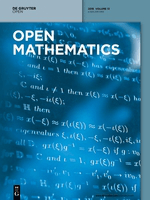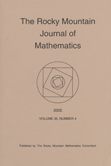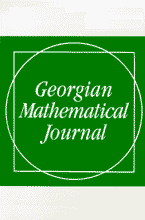
Open Mathematics
Scope & Guideline
Championing Transparency in Mathematical Innovation
Introduction
Aims and Scopes
- Operator Theory and Functional Analysis:
Research in this area includes the study of operators on Hilbert and Banach spaces, functional inequalities, and spectral theory, contributing to both pure and applied mathematics. - Differential Equations and Dynamical Systems:
This scope covers ordinary, partial, and fractional differential equations, including boundary value problems and stability analysis, often applied to physical models and complex systems. - Inequalities and Mathematical Analysis:
The journal emphasizes the development and application of various inequalities, such as Hermite-Hadamard and Sobolev-type inequalities, which are crucial for establishing bounds in mathematical analysis. - Graph Theory and Combinatorics:
Research related to the enumeration, structure, and properties of graphs, as well as combinatorial problems, is a significant focus, highlighting the interplay between discrete mathematics and other areas. - Stochastic Processes and Probability:
This area includes studies on stochastic differential equations, random variables, and their applications in various fields, reflecting the journal's commitment to probabilistic models. - Numerical Methods and Computational Mathematics:
The journal features articles on numerical analysis techniques, including finite element methods and approximation techniques, enhancing the computational aspect of mathematical research. - Algebra and Number Theory:
This includes research on algebraic structures, group theory, and number theory, contributing to the foundational aspects of mathematics.
Trending and Emerging
- Fractional Calculus and Differential Equations:
The increasing interest in fractional derivatives and integrals indicates a growing recognition of their applications in modeling complex phenomena across various scientific fields. - Complex Systems and Nonlinear Dynamics:
Research focusing on complex systems, including chaos theory and nonlinear dynamics, is trending, as these models provide insights into a wide range of natural and engineered systems. - Mathematical Modeling in Real-world Applications:
There is a strong emphasis on mathematical modeling, particularly in fields such as finance, biology, and engineering, showcasing the relevance of mathematics in addressing contemporary challenges. - Data Science and Machine Learning Applications:
The intersection of mathematics with data science and machine learning is emerging, with increasing publications that explore mathematical foundations and algorithms relevant to data analysis. - Algebraic Structures and Their Applications:
Research on algebraic structures, particularly in relation to topology and combinatorial aspects, is gaining momentum, indicating a broader interest in algebra's applications in various mathematical domains.
Declining or Waning
- Classical Geometry:
While geometry remains a vital field, the focus on classical geometric problems has diminished in favor of more complex and abstract geometrical theories, such as those involving algebraic and differential geometry. - Elementary Number Theory:
Research specifically centered on elementary number theory topics, such as basic divisibility and prime number theorems, has seen a decline, with more emphasis now being placed on algebraic and analytic approaches. - Static Models in Mathematical Biology:
The focus on static models in biological applications has waned, as researchers increasingly pursue dynamic and stochastic models that better capture the complexities of biological systems. - Purely Theoretical Mathematics:
There is a noticeable decline in articles that focus solely on theoretical constructs without practical application, as the trend moves toward interdisciplinary research that connects theory with real-world applications.
Similar Journals

PUBLICATIONES MATHEMATICAE DEBRECEN
Connecting Scholars through High-Quality Mathematical ResearchPublicationes Mathematicae Debrecen is a renowned international journal published by the University of Debrecen, Institute of Mathematics, situated in Hungary. This journal, with both ISSN 0033-3883 and E-ISSN 2064-2849, has established itself in the field of mathematics since its inception, with coverage extending from 1997 to 2024. Recognized for its rigorous academic standards, it currently holds a Q3 ranking in the mathematics (miscellaneous) category for 2023 and ranks at the 42nd percentile among general mathematics journals in Scopus. Publicationes Mathematicae Debrecen aims to disseminate high-quality research across various areas of mathematics, contributing to the advancement of knowledge and practice in this dynamic field. Although it is not an open-access journal, its readers can access a wealth of scholarly work that addresses both theoretical and applied mathematical issues, making it an invaluable resource for researchers, professionals, and students alike.

Revista Matematica Complutense
Cultivating Excellence in Mathematical ScholarshipRevista Matematica Complutense is a prestigious peer-reviewed journal published by SPRINGER-VERLAG ITALIA SRL, specializing in the field of mathematics. With its ISSN 1139-1138 and E-ISSN 1988-2807, the journal plays a vital role in disseminating high-quality research and fostering academic discussion within the mathematics community. Recognized for its rigorous selection process, the journal has achieved impressive rankings, holding a Q1 quartile status in the miscellaneous mathematics category as of 2023 and ranking #94 out of 399 in general mathematics according to Scopus, placing it within the 76th percentile. With a publication timeline spanning from 2008 to 2024, the Revista Matematica Complutense continues to serve as an essential resource for researchers, professionals, and students alike. Although it does not currently offer open access, the journal remains committed to advancing mathematical knowledge and providing a platform for innovative research across various mathematical disciplines.

Publications de l Institut Mathematique-Beograd
Connecting researchers with groundbreaking mathematical ideas.Publications de l Institut Mathematique-Beograd is a distinguished journal in the field of mathematics, published by Publications L Institut Mathematique Matematicki in Serbia. With an ISSN of 0350-1302, it aims to disseminate high-quality research across various domains of mathematics, fostering academic discourse and innovation. Despite its open access status being unspecified, the journal is accessible to a wide audience, supporting an inclusive environment for knowledge sharing. The journal's impact is reflected in its 2023 category quartile ranking of Q3 in Mathematics (Miscellaneous), verifying its contribution to the mathematical community. With a Scopus ranking placing it in the 22nd percentile of general mathematics, it serves as a vital resource for researchers, professionals, and students eager to stay abreast of contemporary mathematical advancements. Since its convergence in 2002, and with ongoing publications continuing through 2024, this journal remains a crucial platform for sharing innovative mathematical ideas and results.

ACTA MATHEMATICA HUNGARICA
Connecting Scholars Through High-Impact Mathematical InquiryACTA MATHEMATICA HUNGARICA, published by SPRINGER, is a prestigious academic journal that has been a cornerstone in the field of mathematics since its inception in 1983. With a robust impact factor that reflects its relevance in the discipline, this journal occupies a notable position within the Q2 category in Mathematics (miscellaneous), ranking 167 out of 399 in Scopus for General Mathematics, placing it in the 58th percentile. The journal serves as an essential platform for disseminating high-quality research, offering insights into a diverse array of mathematical topics, including pure and applied mathematics. Although not an open-access publication, it ensures that the latest findings and methodologies reach a broad audience, contributing to ongoing discussions and innovations in the field. By maintaining a commitment to rigorous peer review and academic excellence, ACTA MATHEMATICA HUNGARICA significantly impacts the mathematical community and supports researchers, professionals, and students striving to advance their knowledge and expertise in mathematics.

Rendiconti del Circolo Matematico di Palermo
Advancing Knowledge in the Heart of Mathematics.Rendiconti del Circolo Matematico di Palermo, published by SPRINGER-VERLAG ITALIA SRL, is a revered journal in the field of mathematics, emphasizing the cultivation and dissemination of mathematical knowledge since its inception in 1887. With its ISSN 0009-725X and E-ISSN 1973-4409, this esteemed publication has continued to thrive, showcasing innovative research, comprehensive reviews, and thoughtful discussions from diverse areas in mathematics, particularly in its Q2 ranking within the miscellaneous mathematics category. Its historical significance is underscored by its convergence of publications across numerous years, including its notable periods from 1887 to 1916, 1919 to 1938, and beyond, effectively capturing the evolution of mathematical thought. Though not open access, the journal remains an essential resource for researchers, professionals, and students aiming to stay updated with the latest advancements and methodologies in the ever-evolving landscape of mathematics. With its Scopus rank placing it in the top 25th percentile, Rendiconti del Circolo Matematico di Palermo continues to be a cornerstone for scholarly dialogue and development in its domain.

Italian Journal of Pure and Applied Mathematics
Connecting Ideas in Pure and Applied MathematicsThe Italian Journal of Pure and Applied Mathematics, published by FORUM EDITRICE UNIV UDINESE, is an esteemed platform dedicated to the dissemination of high-quality research within the field of mathematics. With an ISSN of 1126-8042 and an E-ISSN of 2239-0227, this journal serves as a crucial resource for mathematicians seeking to contribute to current discussions and advancements in both pure and applied mathematical sciences. Although the journal currently holds a quartile rank of Q4 in the field of miscellaneous mathematics and is positioned within the 10th percentile of Scopus rankings, it remains committed to fostering valuable academic discourse. This journal particularly welcomes submissions that explore innovative mathematical theories and methodologies, offering a unique insight into the diverse aspects of mathematical research. Operating under a traditional access model, it provides a gateway for researchers, professionals, and students to deepen their understanding and expand their contributions to the mathematical community. With coverage spanning from 2010 to 2024, the journal continues to enhance its reputation as a reliable source of contemporary mathematical scholarship.

Glasnik Matematicki
Elevating Scholarly Exchange in MathematicsGlasnik Matematicki is a prestigious academic journal published by the Croatian Mathematical Society, focusing on a broad spectrum of topics within the field of mathematics. Established in Croatia, this journal has gained recognition for its contributions to the mathematical community, providing a platform for researchers and scholars to share their groundbreaking findings and innovative theories. The journal operates without an open access model, encouraging traditional subscription-based readership, which enhances its standing among journals in the field. With a respectable impact factor and categorized in the Q3 quartile for mathematics (miscellaneous) as of 2023, Glasnik Matematicki is vital for those engaged in advanced mathematical research and education. It aims to disseminate significant mathematical advancements and facilitate scholarly exchange, making it an essential resource for students, professionals, and researchers alike. The journal’s convergence period from 2006 to 2024 marks its ongoing commitment to academic excellence and its relevance in contemporary mathematical discourse.

Periodica Mathematica Hungarica
Unveiling the Depths of Mathematical Knowledge.Periodica Mathematica Hungarica is a prestigious academic journal published by Springer, focusing on the field of mathematics, with a particular emphasis on miscellaneous mathematical studies. Established in 1971, this journal has maintained its commitment to advancing mathematical research and its applications, making significant contributions over its converged years through 2024. With a Q2 ranking in the mathematics category as of 2023, it establishes itself as a vital resource within the mathematical community. Researchers and academics will find its inclusion in the Scopus database, ranking #189 out of 399 in general mathematics, indicative of its impact and relevance. Although it does not feature open access, the journal provides a wealth of high-quality peer-reviewed articles, thereby serving as an essential platform for the dissemination of innovative mathematical theories, methodologies, and findings. Engaging with the content of Periodica Mathematica Hungarica is crucial for anyone looking to stay at the forefront of mathematical research and development.

ROCKY MOUNTAIN JOURNAL OF MATHEMATICS
Fostering Collaboration in Diverse Mathematical FieldsROCKY MOUNTAIN JOURNAL OF MATHEMATICS, published by the Rocky Mountain Math Consortium, serves as a critical platform for researchers and practitioners in the field of mathematics since its inception in 1971. With a notable presence in the academic community, this journal covers a broad spectrum of mathematical disciplines, positioning itself in the Q2 category for Mathematics (miscellaneous) as of 2023. Despite being a subscription-based journal, it is recognized for its rigorous peer-review process and contributions to theoretical and applied mathematics, helping to advance knowledge and foster collaboration among mathematicians. The journal's ISSN number is 0035-7596 and its E-ISSN is 1945-3795, reflecting its commitment to accessibility and dissemination of high-quality research. Based in Tempe, Arizona, at Arizona State University, the journal continues to play an important role in shaping contemporary mathematical discourse through well-researched articles and innovative studies, aiming to bridge gaps between various mathematical subfields and engage a diverse audience, including students and established researchers alike.

Georgian Mathematical Journal
Connecting mathematicians through cutting-edge research.Georgian Mathematical Journal, published by Walter de Gruyter GmbH, is a prestigious academic journal dedicated to the field of mathematics, particularly in its multifaceted applications and theoretical explorations. With an ISSN of 1072-947X and an E-ISSN of 1572-9176, this journal is indexed within notable databases and holds a strong position as evidenced by its Q2 ranking in the Mathematics (miscellaneous) category as of 2023 and a ranking of #140 out of 399 in the general mathematics Scopus category, placing it in the 65th percentile for research visibility. Since its inception in 1994, the journal has continued to evolve, aiming to foster innovative research and scholarly communication among mathematicians worldwide. Although it does not offer Open Access, the journal’s commitment to quality and rigor ensures that published works are of high relevance, appealing to researchers, educators, and students who are dedicated to advancing mathematical knowledge across diverse domains.